BEIJING VERSUS SHANGHAI
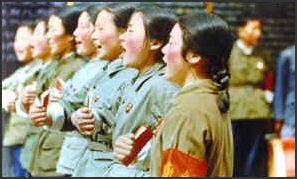
Red Guards in Beijing There is a strong rivalry between Beijing and Shanghai. Beijing held the upper hand as China's capital was boosted by the 2008 Summer Olympics, which occasioned a $45-billion makeover and brought the city the world's attention, along with 1 million visitors. Shanghainese sat sullen through the festivities. “They weren't really cheering,” is how one Shanghaiese put it.[Source: Barbara Demick, Los Angeles Times, October 1, 2010]
The 2010 World Expo put Shanghai back in the spotlight. Shanghai spent nearly $60 billion on the expo and improvements to infrastructure. It eight new subway lines, bringing its total to 11 lines with 246 miles of track. (Beijing has eight lines over 120 miles.) Beijing brought in 3,000 portable toilets for the Olympics; Shanghai, 8,000 for the expo. Both Shanghai and Beijing built new airport terminals.
Barbara Demick of the Los Angeles Times wrote: ‘shanghai got better marks for modernizing without destroying too much of the city's original character. In renovating its Bund area, shunting cars underground and removing an ugly flyover, Shanghai's planners were praised for restoring a riverfront quay to its 1930s glory; Beijing took flak for bulldozing many of its hutongs, the quaint alleys in the historic center...Once running neck and neck as a tourist destination, Shanghai pulled way ahead this year, with more than 70 million people expected to visit the expo.”
Beijing has the top universities, the culture, the grandeur and history, the palaces of Qing emperors past and Communist Party chieftains present. Its main roads are wide enough to deploy a column of tanks. “Beijing is a male city, Shanghai is a female city,” a professor at Shanghai University and one of the city's best-known public intellectuals, told the Los Angeles Times. A Shanghai-born businessman who now lives in Beijing, said: “In Shanghai, people stand in line waiting for the bus. In Beijing, if you drive a Mercedes-Benz, you can run over people with impunity.”
Websites and Sources: Book: Understanding the Chinese Personality mellenpress.com ; Understanding Chinese Business Culture legacee.com ; Status of Chinese People Blog chinaview.wordpress.com ; Chinese Human Genome Diversity Project www.pnas.org ; Opinions on Asian Fetish colorq.org ; Essay on Humor, China and Japan aboutjapan.japansociety.org ; . Book: One of the most enlightening books about China is “Chinese Lives” by Sang Ye and Zhang Xinxin, a series of interviews with ordinary Chinese talking very candidly about what matter to them.
See Separate Articles: REGIONAL DIFFERENCES IN CHINA factsanddetails.com ; ASIAN CHARACTER AND PERSONALITY: HAPPINESS, LOSING FACE, CONFUCIANISM AND BUDDHISM factsanddetails.com ; PEOPLE OF CHINA: DIVERSITY, ASSIMILATION, HAN AND ETHNIC RELATIONS factsanddetails.com ; HAN CHINESE factsanddetails.com ; CHINESE PHYSICAL CHARACTERISTICS AND STRENGTH factsanddetails.com ; CHINESE PERSONALITY AND CHARACTER: CONFUCIANISM, COMMUNISM AND DIVERSITY factsanddetails.com ; CHINESE PERSONALITY TRAITS: INDIRECTNESS, PRAGMATISM, COMPETITION AND FACE factsanddetails.com ; CHINESE CHARACTERISTICS”: A SEMI-RACIST BUT INSIGHTFUL VIEW OF CHINA FROM 1894 factsanddetails.com ; CHINESE SOCIETY, CONFUCIANISM, CROWDS AND VILLAGES Factsanddetails.com/China ; CHINESE SOCIETY AND COMMUNISM Factsanddetails.com/China ; MINORITIES AND TIBET ( Main Page, Click MINORITIES or TIBET) Factsanddetails.com/China
RECOMMENDED BOOKS: “It's All Chinese To Me: An Overview of Culture & Etiquette in China” by Pierre Ostrowski Matthew B. Christensen, Gwen Penner (Illustrator) Amazon.com; “Chinese Characters: Profiles of Fast-Changing Lives in a Fast-Changing Land” by Angilee Shah, Jeffrey Wasserstrom, et al. (2012) Amazon.com; “China Men”, a National Book Award Winner by Maxine Hong Kingston Amazon.com; “Understanding the Chinese Personality: Parenting, Schooling, Values, Morality, Relations, and Personality” (1998) by William J. F. Lew Amazon.com; “Niubi!: The Real Chinese You Were Never Taught in School” by Eveline Chao and Chris Murphy Amazon.com; “The Ultimate Chinese Dictionary of Swear Words: a Chinese Phrase Book of Essential Colloquial Chinese Slang With Contextual Information and Sample Sentences by Liu San Amazon.com; “The Guide to Chinese Horoscopes: The Twelve Animal Signs” by Gerry Maguire Amazon.com; “Chinese Characteristics” (1894) by Arthur H Smith Amazon.com; “Readings in Han Chinese Thought” by Mark Csikszentmihaly Amazon.com; “The Good Earth” by Pearl Buck(1931). Amazon.com;“The Book of Chinese Names: A Guide to Auspicious and Elegant Names” by Goh Kheng Chuan and Goh Kheng Yew Amazon.com
History of Beijing-Shanghai Rivalry
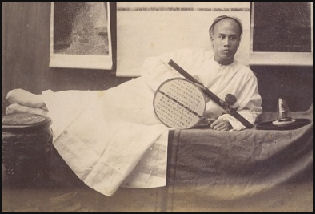
opium smoker in Old Shanghai Shanghai is regarded as more foreigner-friendly. The most vivid illustration of this is its acceptance of 30,000 Jewish refugees during World War II. Although the colonial period is now part of the distant past, the neighborhoods of the old French, Russian, American and British concessions retain enough of their character to keep the tradition alive.[Source: Barbara Demick, Los Angeles Times, October 1, 2010]
“After the communist victory in 1949, Shanghai's cultural predominance was eclipsed by Beijing's. The city remained, however, the financial capital. Through the 1980s, it paid a staggering share of China's total tax revenue, by some estimates, 70 percent.”
“Although former Chinese President Jiang Zemin served as Shanghai's mayor and party secretary, the influence of the so-called Shanghai clique has been eclipsed since Hu Jintao became president in 2003. Then Chen Liangyu, a later Shanghai party secretary, was ousted on corruption charges and replaced on the Politburo by Xi Jinping, the current favorite to succeed Hu as president.”
‘shanghai has become a really beautiful city again with the expo, but the center of power is Beijing,” a Shanghai businessman said. “You drive up and down the ring roads of Beijing and you see the headquarters of the companies — Petrochina, China Mobile.... It is the nature of this form of government.”
People from Beijing
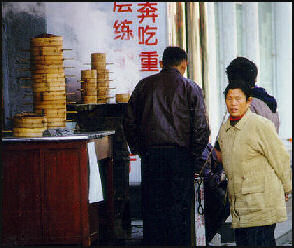
Street dumplings in Beijing
The residents of Beijing are often described as thermoses — cold on the outside and warm on the inside and gregarious. They are also regarded by other Chinese as aloof and having a droll, ironic sense of humor.
Todd Carrel, a former bureau chief in Beijing for ABC news, wrote in National Geographic, "I found Beijingers hospitable and generous...Standoffish at first, they open up with a little encouragement, eager to talk about life in the West, politics, culture, personalities — no morsel too small...They were frank, opinionated and cheeky, as evidenced by the jokes...Beijingers...were, in short, as tough as dragon’s hide, the ultimate survivors...One anchor is family. Another is humor, which is usually acrid and never far beneath the surface."
One film maker told the Los Angeles Times, “People from Beijing love to talk politics and critique society.” In Beijing there is a deeply embedded “ye”, or master, culture formed by being at the center of north imperialist and Communist power.
Beijing is a historical city and the former center of a great empire. Today it is the heart of the officially-sanctioned culture of the ruling Communist party and the home of its intellectual, literary and artistic elite, which gives it a reputation for being edgier and more avant grade than other places.
Shanghaiese regard Beijingers as warmhearted but country bumpkins at heart, ill-mannered and unable to hold their liquor. One man from Shanghai told the Washington Post, “Beijing people are a little crude.” Another told a story of woman in Beijing who watched a man open a car door for a woman and asked her boyfriend why never did that. “Ah, he’s from Shanghai,” the boyfriend said, as if that explained everything.”
On 58-year-old watchman in Shanghai told the Washington Post, “Beijing people give us the impression of being rude, freewheeling and bad-tempered. An argument of a few sentences will trigger a fight in Beijing, that kind of thing.”
When asked what she thinks about Beijingers a 56-year-old Shanghai restaurateur put her hands on hips, scowled, puffed out her chest and squared her shoulders, doing the best imitation of a pompous bureaucrat, and told the Los Angeles Times, “They stand like this. They're sooo annoying. Just because they come from the capital, they act like they're running the country.”[Source: Barbara Demick, Los Angeles Times, October 1, 2010]
Anti-Foreigner Sentiments in Beijing?
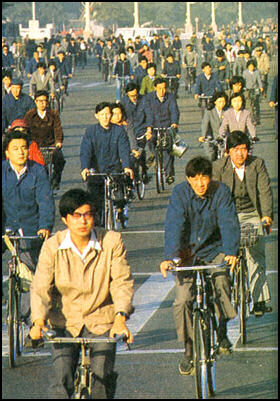
Bicycle riders in 1980s Beijing Film critic Shelly Kraicer wrote: “During a recent interview with an independent Chinese journalist, I was somewhat taken aback...by an anonymous commenter who was skeptical that Westerners could be so interested in debating Chinese movies and ideology, when in fact it has nothing to do with them” [Source: Shelly Kraicer, dGenerate Films, July 21, 2010]
At the risk of answering one cultural judgment with another, I find this display of an aggressively protective attitude to Chinese culture to be distinctly Beijing-ese. Hong Kong, Taipei and Shanghai tend to be much more relaxed about foreigners in their midst, given their cosmopolitan histories. Their urban intellectual cultures more readily admit other voices — foreign voices, alternative points of view — with fewer hangups than Beijing’s thriving and otherwise open intellectual culture.
People in Beijing are often curious about what I’m working on (film research, for example), and are curious to hear my opinions, though they often far too quickly take these as somehow representative of a particular template of what a Westerner thinks about our Chinese movies (which is rather often far from the case, especially with my willfully idiosyncratic readings of what I’m watching here). But there comes a point in most conversations I have with Chinese colleagues where things sadly grind to a halt, to a refrain something like there are just certain things you won’t be able to understand, since you’re not Chinese. You can almost hear the intended effect: the portcullis clangs down, the drawbridge ratchets up, and the castle is secure with you safely outside. What can a non-Chinese person say to that? Any attempt to argue the point circles back to demonstrate that you just can’t know. It’s a completely self-sealing argument.
People from Shanghai
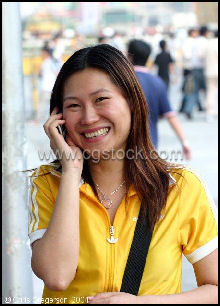 Brook Larmer wrote in National Geographic, ‘shanghai natives form an urban tribe, set apart from the rest of China by language, customs, architecture, food, and attitudes. Their culture, often called haipai (Shanghai style), emerged from the city's singular history as a meeting point of foreign merchants and Chinese migrants. But over the years it has become a hybrid that confounds the very idea of East and West. "In foreigners' eyes Shanghai is part of 'mysterious China,'" says Zhou Libo, a local comedian. "In the eyes of other Chinese, Shanghai is part of the outside world." [Source: Brook Larmer, National Geographic, March 2010]
Brook Larmer wrote in National Geographic, ‘shanghai natives form an urban tribe, set apart from the rest of China by language, customs, architecture, food, and attitudes. Their culture, often called haipai (Shanghai style), emerged from the city's singular history as a meeting point of foreign merchants and Chinese migrants. But over the years it has become a hybrid that confounds the very idea of East and West. "In foreigners' eyes Shanghai is part of 'mysterious China,'" says Zhou Libo, a local comedian. "In the eyes of other Chinese, Shanghai is part of the outside world." [Source: Brook Larmer, National Geographic, March 2010]
The people of Shanghai are considered "blunt, offhand, presumptuous and affluent." Traditionally more worldly, Westernized and wealthy than other Chinese, they like their food cooked in rapeseed oil and view themselves as different from other Chinese, who they sometimes dismiss as still living in the Stone Age. The rapid Shanghai dialect is difficult for those outside the Shanghai area to understand.
Shanghainese are sometimes compared to New Yorkers. They both carry themselves with haughty superiority and share a sort of "it-stinks-but-its-great" attitude about their cities. One Hong Kong banker said the Shanghainese "have a strong sense of self-importance." Both Shanghai and New York have traditionally been regarded as places where one can find anything: fashion, drugs, girls...and boys.Others have compared Shanghai people with Singaporeans. Peter Kwan, a professor of Asian American studies at Hunter College, wrote in the New York Times, “the people of Shanghai, whether rich or poor, have always regarded themselves to be more rational and efficient than their countrymen. They have always reproached the people of Beijing for talking about politics, while they themselves got things done. They are especially proud of their trademark way of doing things — the so-called “haipai” style.”
People from Shanghai live to an average of 76.5 years, about 6½ years longer than the people from the rest of the country. The mayor of Shanghai told the Washington Post that the reason for this is that they do tai chi exercises every morning and go to bed before 10 every night.
One Shanghainese trait is its obsession with the new. “Unlike other parts of China, which feel the weight of ancient history, young Shanghai is always seeking the cutting edge. Sammy's bandmates call her "the quintessential Shanghai girl" not simply because she looks abroad for her cues in music (rocker Avril Lavigne), fashion (the Japanese magazine Vivi), and lifestyle (her living arrangement is more Friends than Confucius). It's mainly because of the unapologetic ease with which she mixes new ideas with her Shanghainese style.
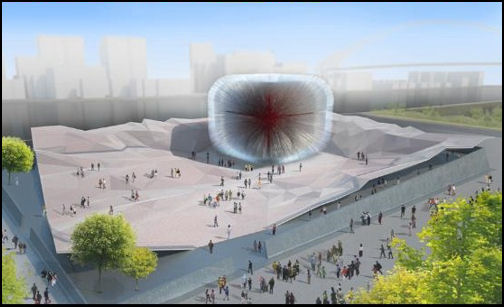
British Pavilion at Shanghai Expo 2010
Shanghai men are reputed to be vicious in business — hence the term shanghaied — but wimps at home. “At home, they do the dishes, take out the trash and give their wife/mistress a neck rub after the hard day she put in shopping,” wrote one blogger on a site called China Forum. A 28-year-old Beijing-born teacher who moved to Shanghai for work in 2001.’shanghai people are selfish. Even the people my age, all they talk about are material things, their clothes, the stock market. All they care for is themselves and money.” [Source: Barbara Demick, Los Angeles Times, October 1, 2010]
The Shanghainese have a reputation for snobbery, and Chinese often complain that they feel shut out in Shanghai, perhaps because the dialect is almost incomprehensible to Mandarin speakers. Larimer wrote, "The Shanghai dialect is rich and guttural. The language has been losing ground since the 1950s, when Beijing launched its campaign to unify the country with standardized Mandarin. The crowded lilong served to sustain the dialect; in the suburbs, families often retreat to their private spaces, blocked off from each other. Even so, many proud Shanghainese use the language as a secret code to signal that they belong to the in crowd — and often to ensure fair deals in local shops.
Of late the Shanghaiese have tried to portray themselves as more warm-hearted and compassionate. In the autumn of 2007 Shanghai hosted the Special Olympics. More than 1,200 of the 8,000 athletes that participated were Chinese. Chinese President Hu Jintao presided over the opening ceremony. To promote the events billboards with happy-faced special athletes and signs with characters for “civilization,” “humanism” and “love” were posted all over town. The Shanghai mayor said the point of hosting the Special Olympics was to help create “a civilized and harmonious environment for all.”
Shanghaiese Versus Beijingers
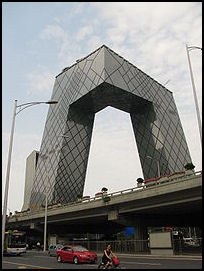
CCTV Headquarters in Beijing Many Shanghaiese disagree that Beijing is the cultural center of China. A Shanghai shopowner told the Washington Post, ‘shanghai has always been a more cultural city than Beijing, The French came here. The British came here. They all left their imprints. So Shanghai is more open than Beijing."
Shanghai is considered a fashion center while Beijing is regarded as China’s cultural and intellectual center. ‘shanghai men dress better than the Beijing women,” a photographer who lives in Beijing told the Los Angeles Times. On the other hand, If you walk out your door in Beijing, you have a much better chance of bumping into somebody with whom you can have an intellectual conversation.” [Source: Barbara Demick, Los Angeles Times, October 1, 2010]
The Shanghai-based writer Wang Anyi told Newsweek: ‘Shanghai people have a long tradition of following the rules. Beijing people are a bit wild and grandiose.” To the Shanghainese, the Beijingers — and all northerners, for that matter — are peasants. “They smell like garlic,” the restaurateur told the Los Angeles Times, “We Shanghai people keep ourselves and our homes very clean. We are more refined. We drink coffee. They only drink tea.”
Shanghai women are known for being flashier, more fashion conscious and wearing more make up than their Beijing counterparts. Shanghai men are known for having better manners. It is said a Shanghaiese man without a shirt would make an effort to put a shirt on when greeting a guest, a Beijing man would not.
Beijing Uber Passengers Vs. Shanghai Uber Passengers
Jasper Fu is a Beijing native married to a woman from Shanghai. He is a part-time Uber driver in Shanghai. Zheping Huang wrote in Quartz: “He also intentionally picks up Uber passengers after he goes to a state-backed aerospace academy in Beijing to sell electronic components. He wants to know from the passengers coming from the academy “what products they are making,” he said. “I might get some opportunities.” [Source: Zheping Huang, Quartz, February 17, 2016]
“Because Fu drives in China’s two biggest cities, he’s had a chance to analyze the different personalities of Shanghai and Beijing passengers. Shanghai passengers are more respectful and “petty-bourgeois,” while Beijing passengers are more “penny-wise” and rude, he said.
“In Beijing, he speaks to his passengers in a harsh manner, complaining directly to them if they didn’t clearly put their destinations. In Shanghai, he starts sentences with “please,” talks patiently, and even hides a bit his strong Beijing accent which heavily employs the “er” sound at the end of words.
Shanghaiese and Business
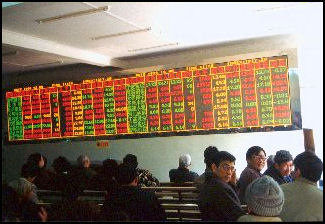
Shanghai stock exchange
Shanghaiese are known for business sense, savoir-fair and the embrace of all things foreign. A sign outside the airport in Shanghai reads; “Welcome to Stylish Shanghai.” Beijingers regard them as snobs and look down on them their crass love of money and material things and ignorance about culture, preferring to “buy a new pair of shoes than a ticket to the ballet.”
In terms of doing business, Shanghaiese prefer to dismiss the small talk and get right to work and are known for carefully examining the fine print where as Beijingers prefer to have a big meal, make a lot toasts and drink up before settling down to business. One Shanghaiese wroter told the Washington Post, “In Shanghai, we don’t become brothers. If we are doing business, its cooperation, and so we sign on the dotted line.” A Korean who lives in Shanghai told The New Yorker, “You can do business with them. But you should realize that, in the end, they are always going to win.”
Shanghai Versus Hong Kong
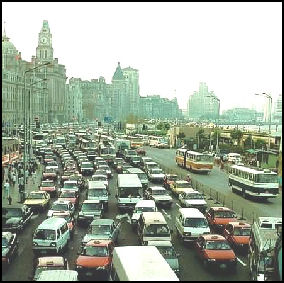
Shanghai traffic Shanghai also has a rivalry going with Hong Kong that centers around which city is going to be the financial center of China as well as which is the more vibrant, diverse, worldly and cosmopolitan city and the one that is more fun to live in and best for conducting business. The highest building in Shanghai is 26 feet taller than the one in Hong Kong (1,614 feet compared to 1,588 feet) and its subway has 11 lines, totaling 261 miles, compared to 9 lines covering 106 miles in Hong Kong. It also has more Starbucks than Hong Kong (122 to 106 in 2010) . The decision to building a Disney theme park in the Shanghai was seen by Hong Kong as a major blow. [Source: Keith Richburg, September 28, 2010, Washington Post]
Hong Kong is home to 7 million people. It has income tax rates of 15 percent and corporate tax rates of 16.5 percent and had 1,298 multinational companies with regional headquarters and $48.4 billion in direct foreign investment in 2009. By contrast Shanghai is home to 19.2 million people. It has income tax rates of 45 percent and corporate tax rates of 25 percent and had 260 multinational companies with regional headquarters and $13.3 billion in direct foreign investment in 2009. [Source: Washington Post]
Murray King of the Shanghai-based APCO consulting firm told the Washington Post, ‘shanghai is trying to be the Hong Kong of China ...It is also trying to be the Detroit of China from an automotive perspective, it’s trying to be a Seattle of China from an aerospace perspective, and it’s trying to be Silicon Valley from an IT perspective.”
Hong Kongers still view Shanghai like mainland China itself as wild, disorderly and ill-mannered place. One Hong Kong businessman told the Washington Post, ‘shanghai seems quite mainland, and that’s code-speak for not quite civilized.”
Shanghaiese regard Hong Kong as having had its day in the sun and is now on the decline. Xu Minqi, a Shanghai-based economist told the Washington Post, “The problem with Hong Kong is they need to change their infrastructure, especially their soft infrastructure...They need to attract talent, to develop new science and technology.” There is widespread feeling that to much wealth in Hong Kong is generated by real estate and “industries are hallowing out.” Minqi added, “But Hong Kong companies know how to make money.”
Image Sources: 1) University of Washington; 2) Beifan.com 3) cgstock.com http://www.cgstock.com/china ; CNTO, Shanghai Expo, Perrechon
Text Sources: New York Times, Washington Post, Los Angeles Times, Times of London, National Geographic, The New Yorker, Time, Newsweek, Reuters, AP, Lonely Planet Guides, Compton’s Encyclopedia and various books and other publications.
Last updated September 2021
